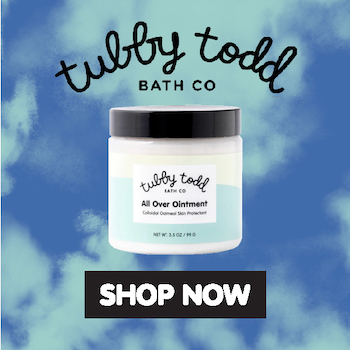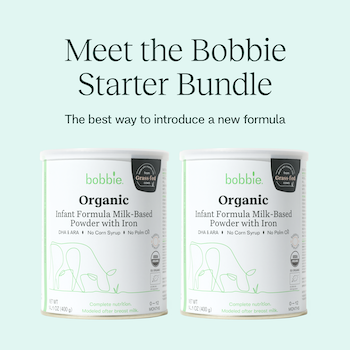Heading home from the hospital with our newborn, I told my husband I wanted him to stop and grab some formula in case we needed it. I figured the time to get it was before we ran into a middle-of-the-night scenario that required it. The trouble is, because I was anticipating exclusively breastfeeding, I hadn’t given much thought to formula. In fact, I had given it exactly zero thought.
I told my husband, “Just get the most expensive one and that should mean it’s halfway decent. Then, if we actually need formula, we’ll do more research.” He brought the formula home and was shocked at the price ($60). I took a look at the ingredients list and was instantly mortified — this formula had palm oil as one of the first ingredients. There wasn’t one ingredient that I felt comfortable feeding my little guy.
As luck would have it, I got a terrible case of mastitis a few days after coming home and we DID need formula. Against my mom judgment, we opened the formula we had purchased and it smelled terrible. After mixing it with the right amount of water, my husband and I also tried it ourselves and it was SO bad! But it’s what we had, so we used it for a few feedings while I frantically researched other options.
I asked my fellow mom friends what they were using and read up on a ton of articles. Here’s what I found about most of the formulas out there,
- Low-Quality Ingredients: Many baby formulas are made from low-quality ingredients, including highly processed sugars, synthetic vitamins, and unhealthy fats. Some formulas even contain additives, preservatives, and artificial flavors.
- Potential Contaminants: Heavy metals, pesticides, and harmful chemicals have been found in some formulas, posing serious health risks to infants. Despite regulatory measures, the presence of these contaminants remains a concern.
- Digestive Issues and Allergies: Babies fed with commercial formulas often experience digestive issues such as constipation, gas, and reflux. This could be attributed to the artificial ingredients, excessive sugar content, or the lack of probiotics and enzymes necessary for proper digestion. Moreover, some infants develop allergies or sensitivities to common formula ingredients like cow’s milk protein, soy, or lactose, leading to discomfort and potential long-term health issues.
Luckily, there are a few outliers — companies that are really trying to change the industry! We ended up choosing Bobbie for our family.

You can try their starter bundle with this affiliate link.
Bobbie is both USDA and EU organic certified recipe and there is no soy allergens or added palm oil. It’s also founded by mommas instead of being owned by massive corporations. Now that we’re supplementing as-needed, it’s also super helpful that Bobbie comes in smaller cans (did you know you are supposed to toss a can 30 days after opening?! So if you’re supplementing, this can mean throwing away a lot of unused formula).
It doesn’t smell bad (this should be a nonstarter but apparently it’s a big thing within the world of formulas) and our little guy readily drinks it just as he does breast milk. We did the taste test with Bobbie too and while It’s not amazing, there’s no comparison to the other one we tried.



